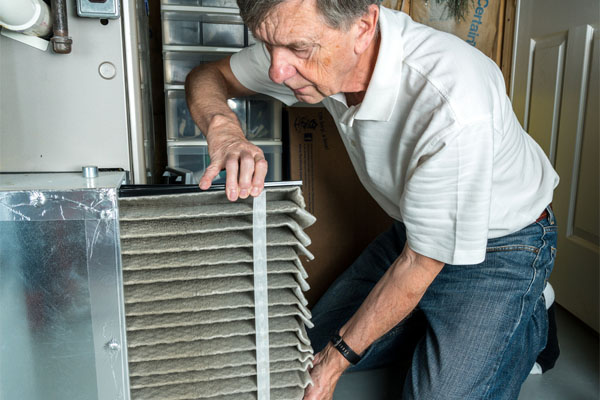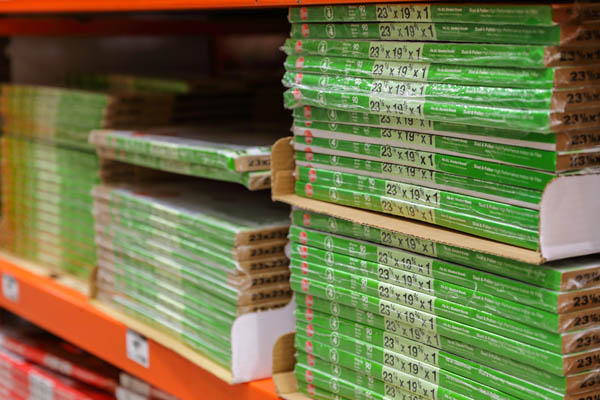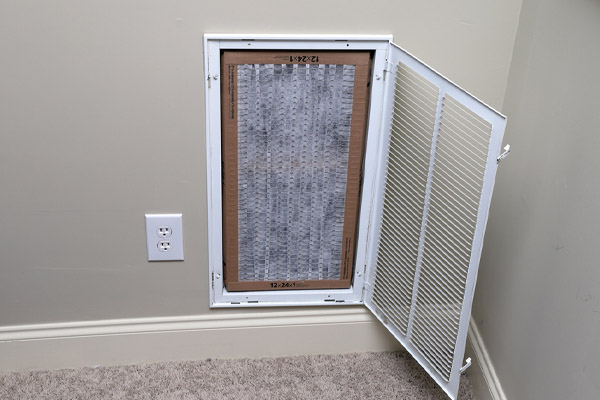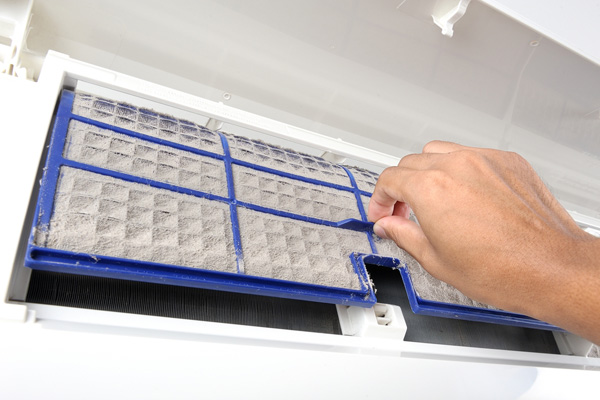Can Furnaces Work Without Filters?

Furnaces are key in maintaining warmth and comfort indoors, particularly in cold climates, by circulating heated air. Furnace filters, an essential part of this system, trap dust and allergens to keep air quality high and the furnace efficient. This article answers the question, “Can furnaces work without filters?”. We’ll examine whether these filters are essential for furnace operation, exploring how furnaces function both with and without filters.
Understanding Furnace Filters
Contents
- 1 Understanding Furnace Filters
- 2 Call McAllister Energy For All Your Home Heating Needs
What are Furnace Filters?
Furnace filters, crucial to heating systems, are made from fibrous materials and designed to trap airborne particles like dust, pollen, and pet dander. Their pleated structure increases surface area for effective particle trapping. As air moves through the furnace, these filters serve as a barrier, allowing only clean air to circulate into the living space.
Types of Furnace Filters

There is a variety of furnace filters available, each with its own characteristics:
- Disposable Fiberglass: These are the most basic and affordable. Made from spun fiberglass, they are effective for blocking large particles.
- Pleated: Made from higher-quality materials, they offer better filtration by trapping smaller particles.
- Electrostatic: Utilizing static electricity, these filters attract and capture particles. They are available in both disposable and reusable forms.
- HEPA (High-Efficiency Particulate Air): Known for their high efficiency, HEPA filters capture the smallest of particles, including bacteria and viruses.
The Importance of Furnace Filters
Furnace filters are essential for preserving indoor air quality and protecting the furnace. They trap harmful particles, ensuring clean air circulation and preventing dust and debris from causing wear and tear on furnace components. This enhances the furnace’s longevity and efficiency, leading to reduced maintenance costs and improved system reliability.
Furnaces Operating Without Filters

Can Furnaces Work Without Filters?
While furnaces can technically function without filters, doing so is ill-advised due to major downsides. Running a furnace without a filter circulates dust and allergens freely, degrading indoor air quality and comfort. Over time, this can severely damage the furnace’s internal parts, reducing efficiency, increasing wear and tear, and potentially leading to expensive repairs.
Risks Associated with Operating Furnaces Without Filters
The risks of running a furnace without a filter extend beyond the furnace itself:
- Impact on Furnace Components: Dust and debris can accumulate on important components like the blower motor and heat exchanger. This buildup can lead to overheating, reduced efficiency, and eventually, complete system breakdowns.
- Health Risks: For individuals with allergies, asthma, or other respiratory conditions, the importance of clean air cannot be overstated. Without a filter, a furnace can circulate harmful particles throughout a home, exacerbating these health issues. Even for those without existing conditions, poor indoor air quality can lead to discomfort, such as irritation of the eyes, nose, and throat, and can contribute to long-term health problems.
The Debate Over Efficiency and Necessity
Arguments for Operating Without Filters
Some individuals or groups argue that furnace filters, especially those with a high MERV (Minimum Efficiency Reporting Value) rating, can restrict airflow. This restriction, they claim, forces the furnace to work harder, potentially reducing its overall efficiency and lifespan. In certain scenarios, such as during extensive cleaning or renovations when dust levels are temporarily higher, it might be suggested to remove the filter to prevent it from becoming quickly clogged and thus hindering airflow.
Counterarguments Emphasizing the Necessity of Filters
However, these arguments are largely outweighed by the benefits of using filters:
- Efficiency Myths Debunked: Modern furnaces are designed to operate optimally with filters. While it’s true that a dirty or overly restrictive filter can hinder airflow, using an appropriately rated filter does not reduce efficiency. In fact, it helps maintain it by protecting the internal components from dust and debris.
- Long-term Savings: Using filters can actually lead to long-term savings. By protecting the furnace from dust and wear, filters reduce the likelihood of costly repairs and extend the lifespan of the furnace.
- Health Benefits: The health benefits of using furnace filters cannot be overstated. They play a crucial role in maintaining indoor air quality, trapping harmful particles that can lead to respiratory issues and other health problems.
Filters not only protect the furnace and extend its lifespan but also significantly improve the quality of air inside a home, leading to a healthier living environment.
Best Practices and Recommendations

Selecting the Right Furnace Filter
Choosing the appropriate furnace filter is essential for both efficiency and air quality. Here are some key considerations:
- Furnace Model Compatibility: Ensure the filter is compatible with your specific furnace model. Incorrect sizes or types can hinder performance.
- Household Needs: Consider any specific needs, such as allergies or pets, which might necessitate a higher-grade filter.
- Budget: Balance your budget with your needs. Higher-end filters like HEPA might offer better filtration but are more expensive.
- Understanding MERV Ratings: MERV ratings, which range from 1 to 16, indicate a filter’s ability to trap particles. Higher ratings mean finer filtration. Choose a filter with a MERV rating that fits your household’s needs without overly restricting airflow for your system.
Maintenance and Replacement of Furnace Filters
Regular maintenance and timely replacement of furnace filters are crucial:
- Regular Checks: Check your furnace filter monthly, especially during high-use seasons or if you have pets.
- Replacement Frequency: Replace filters as needed, which is typically every 90 days for standard filters. Homes with pets or individuals with allergies may require more frequent changes.
- Signs of a Dirty Filter: Look for visible dirt accumulation, a noticeable decrease in indoor air quality, or reduced heating efficiency. These signs indicate it’s time to replace the filter.
- Keeping Spares: Keep spare filters on hand for convenient replacement.
Proper maintenance and timely replacement of furnace filters not only ensure efficient furnace operation but also significantly improve the air quality in your home.
Technological Advancements and Future Trends in Furnace Filters
Smart Filters and Monitoring Systems
The growing trend of integrating technology into furnace maintenance is highlighted by advancements like smart filters and monitoring systems. These innovations alert homeowners when to replace filters and can monitor air quality and filter condition in real-time. This technology enhances furnace maintenance by making it more timely and efficient, potentially prolonging furnace lifespan and improving indoor air quality.
Sustainable and Eco-friendly Furnace Filters

Sustainability is another key trend in the development of furnace filters. These innovations contribute to energy efficiency in two primary ways:
- Reduced Waste: Eco-friendly filters are often made from biodegradable or recyclable materials, reducing landfill waste.
- Energy Efficiency: Some sustainable filters are designed to maintain optimal airflow with less energy consumption, contributing to overall energy efficiency in home heating systems.
The adoption of sustainable and eco-friendly furnace filters is not only beneficial for the environment but can also be cost-effective. As awareness for environmentally friendly options increases, we can expect further innovations in this field.
Conclusion
Operating a furnace without a filter risks poor air quality, health issues, and furnace damage, leading to extra costs and lower efficiency. Regular maintenance of furnace filters is vital for optimal performance and air quality. Advancements like smart filters and eco-friendly options improve furnace efficiency and environmental impact. Homeowners should use suitable filters, maintain them well, and stay updated on new technologies for safe, efficient, and eco-friendly furnace use.
Call McAllister Energy For All Your Home Heating Needs
For all your HVAC and oil delivery needs, contact McAllister Energy. We have some of the most highly qualified and professionally certified technicians in Southern New Jersey. Each of our friendly techs can conduct all kinds of HVAC services, such as oil tank upgrades, boiler repair, ductless installations, furnace replacements, and more. We have various oil delivery plans and financing options. This way, you can customize your fuel deliveries to meet your needs. Our heating oil delivery and HVAC services are affordable and are done accurately and promptly at all times.
All of our services come with a guarantee. Our HVAC maintenance services improve your energy efficiency and home comfort while decreasing your HVAC costs. We can also assist you when you need to replace your heating and cooling system. We will help you find the best make and model for your home without sacrificing your budget. Our experts have the skills, training, and experience to ensure that all your home comfort needs are met. Book an appointment with us today. Call McAllister Energy for a free, in-home estimate.
You can click here to contact us now or call us at (856) 665-4545 to find out more! Click the link to view our service area.

Related Articles: